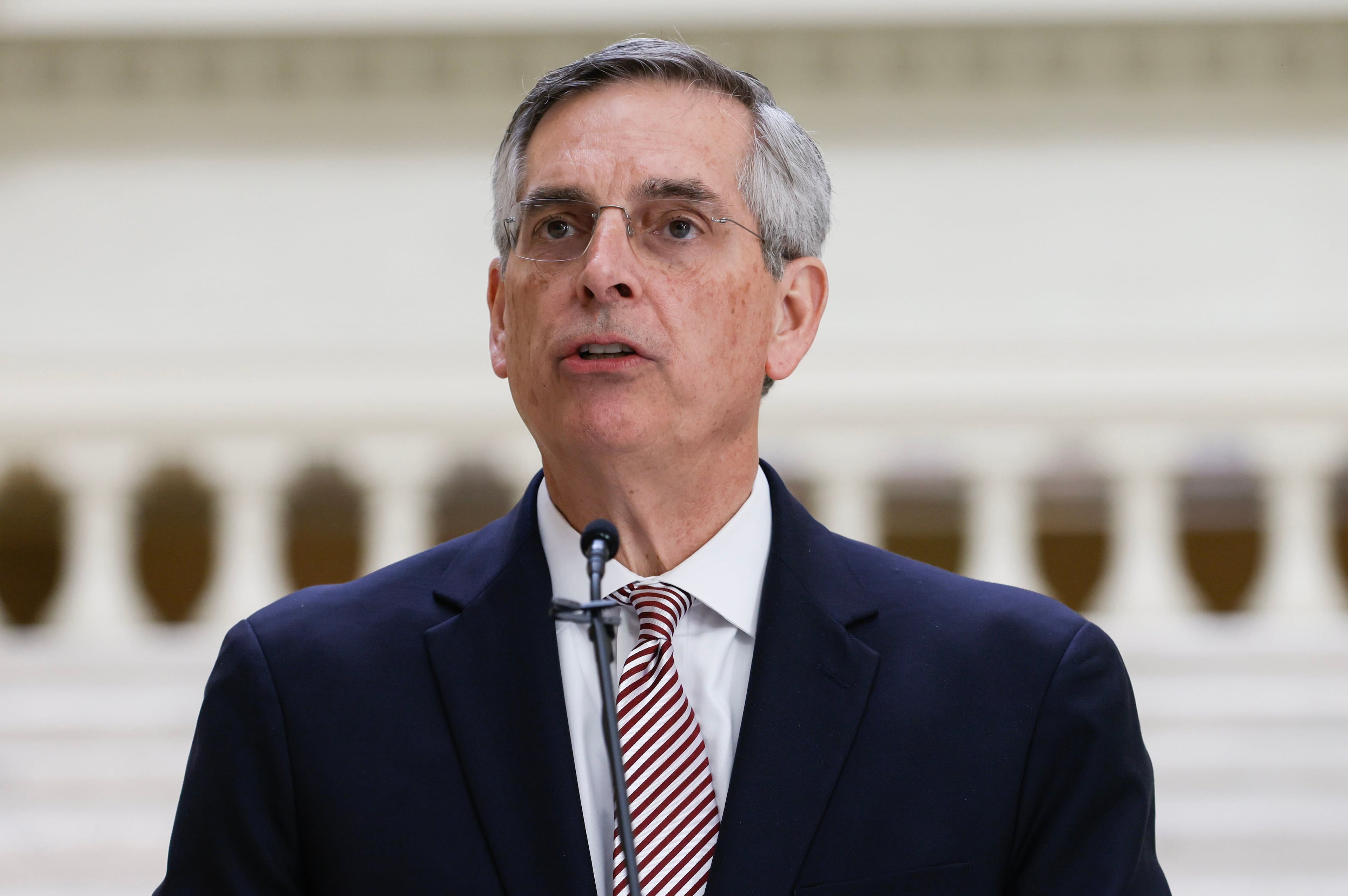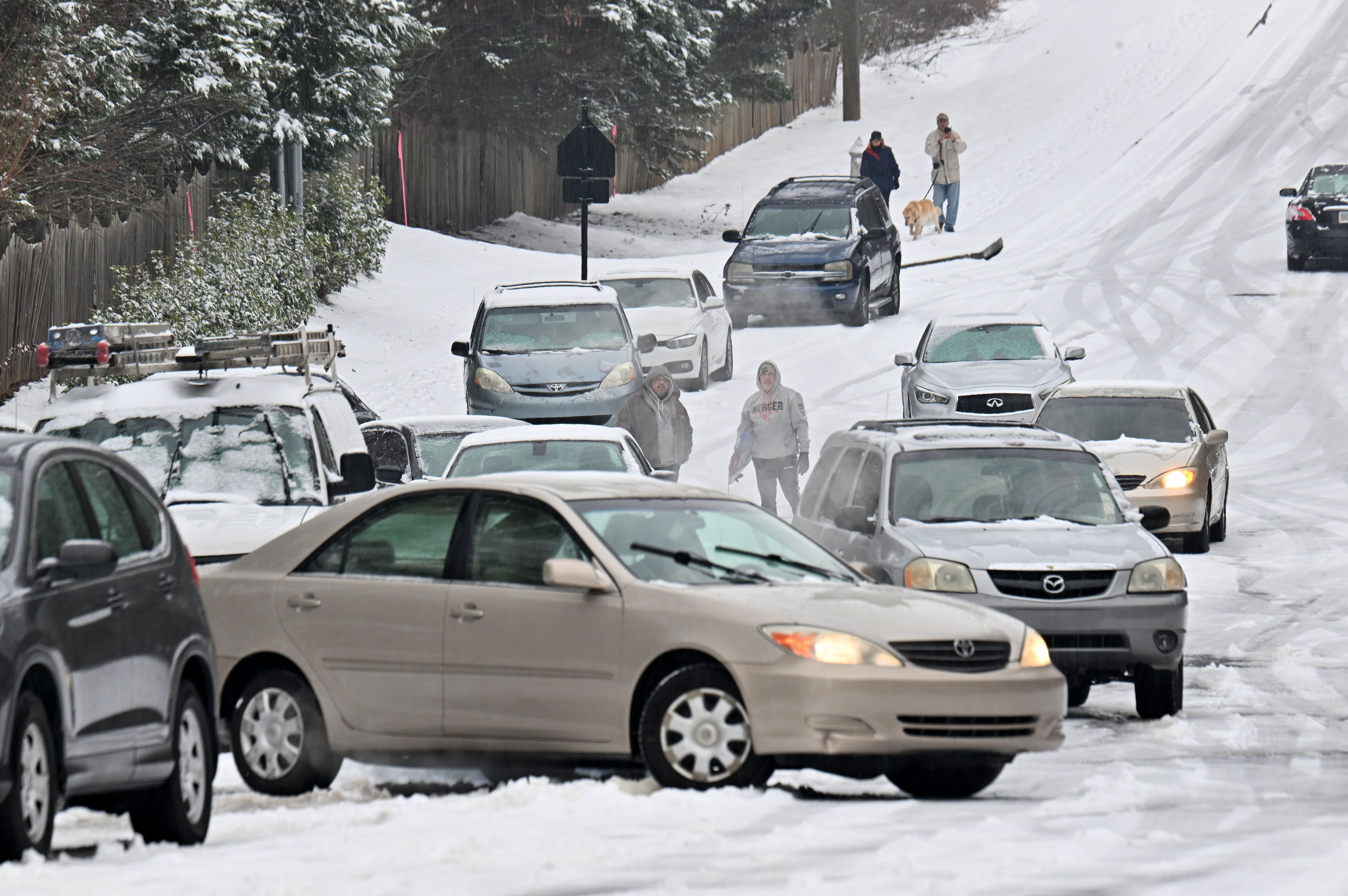Fairness of Georgia elections challenged by far-reaching lawsuit

A sweeping lawsuit filed Tuesday in the wake of Georgia’s fierce race for governor calls for a federal judge to overturn state laws that resulted in purged registrations, canceled ballots and many other obstacles to voting.
Backed by former Democratic nominee for governor Stacey Abrams, the lawsuit continues a fight for voting rights that formed the foundation of her campaign. Abrams isn't trying to change the result of this month's election that she lost to Republican Brian Kemp, but the upcoming legal battle could decide the rules for elections in 2020 and beyond.
The lawsuit, filed by a new group called Fair Fight Action, demands that Georgia use paper ballots to validate the accuracy of elections, stop canceling voter registrations of those who haven't participated in a recent election and guarantee enough election equipment so voters don't have to wait in line for three hours or more. It also seeks to weaken the state's "exact match" law, which stalled voter registrations of some legitimate voters because they had hyphenated or long names.
“The constitutional rights of Georgians were trampled in the 2018 general election,” said Lauren Groh-Wargo, CEO for Fair Fight Action and Abrams’ campaign manager. “The general election for governor is over, but the citizens and voters of Georgia deserve an election system that they can have confidence in.”
Abrams has said the election wasn't fair because it limited voting access, disenfranchised minorities and undermined the public's trust in democracy. Abrams is a member of Fair Fight Action's board but didn't attend a press conference announcing the lawsuit at the Richard B. Russell federal court building.
The lawsuit says Kemp, who resigned his position as secretary of state after Election Day, "grossly mismanaged" the election by failing to provide enough voting machines, ensure that they were functioning correctly and advise local election officials to prepare for high turnout.
Kemp has argued that county officials are responsible for running elections, not the Secretary of State’s Office. He said Georgia’s laws make it easy to vote and hard to cheat.
“With a record high of 7 million people on Georgia’s voter rolls and unprecedented turnout in November’s midterm election, it has never been easier to vote or make your voice heard at the ballot box,” said Candice Broce, spokeswoman for Secretary of State Robyn Crittenden, a defendant in the lawsuit. “We remain committed to secure, accessible and fair elections for all voters.”

The legal case will be built on the stories of more than 40,000 voters who called a hotline to report problems at the polls, Groh-Wargo said.
Their experiences will demonstrate that malfunctioning voting machines flipped votes to Kemp,legitimate voters were turned away from the polls, and provisional ballots went uncounted, according to the lawsuit.
Some voters said they were denied ballots because their their registrations had been canceled. Others endured long lines and glitchy voting machines. Many had to travel longer distances to their polling places because 214 precincts have closed across the state since 2012.
One voter, Emory University freshman Phoebe Einzig-Roth, said she was told her U.S. citizenship couldn’t be verified even though she was born in New York and provided a driver’s license, U.S. Passport, student ID and Social Security number. She said DeKalb County elections workers couldn’t explain why her citizenship was flagged.
“I was personally offended,” said Einzig-Roth, who attended the Fair Fight Action press conference Tuesday. “Then I realized this is happening to so many people all over the country, largely Democratic voters and largely people of color. Their votes are not being counted.”
Einzig-Roth said election employees told her the registration problem had been corrected, but it still wasn’t resolved a week after the Nov. 6 election. She doesn’t know whether her vote on a provisional ballot was counted.
Kemp said last week that "ridiculous lawsuits" over Georgia's election system don't worry him as he prepares to take office as the state's governor. Kemp defeated Abrams by about 55,000 votes of more than 3.9 million ballots cast.
When asked for a response to the lawsuit, Kemp spokesman Ryan Mahoney said the governor-elect is spending this week meeting with public safety and economic development leaders.
“He is focused on building a safe and prosperous future for Georgia families,” Mahoney said.
There are now at least 11 lawsuits pending in federal and superior courts challenging Georgia’s election systems and practices.
Some of those lawsuits have already resulted in changes, with federal judges issuing orders to lift hurdles facing new U.S. citizens trying to vote for the first time, review the validity of provisional ballots and count absentee ballots if they could be verified despite some missing information.
The 66-page lawsuit filed Tuesday makes many allegations and requests broad remedies to Georgia’s election system and laws, meaning it could take years to wind its way through the legal process. No judge has been assigned to the case yet.
Many of the alleged problems with Georgia's elections disproportionately affect poor and minority voters, said state Sen. Nikema Williams, who was arrested inside the state Capitol two weeks ago during a protest to demand that every vote be counted in the election. Many voters can't afford to take time off from work to wait in line to vote, or to confront election officials about the status of their voting registration.
“Your zip code, your race, your gender or your income level should not determine if your vote is counted,” said Williams, D-Atlanta, the state director for Care in Action, which represents more than 30,000 domestic workers. “We have been fighting for every eligible vote to count.”
An attorney for Fair Fight Action, Allegra Lawrence-Hardy, said Georgia’s elections are so problematic that they violate the most fundamental principles of democratic government.
“At the heart of our Constitution is that each person gets a vote,” Lawrence-Hardy said. “Our prayer for relief asks the court to step in to the elections process to protect the Constitution by helping create a system that allows for free and fair elections so that people do not have the problems that we have heard about from 40,000 people.”
The story so far
What happened: A nonprofit group sued Georgia officials Tuesday over election problems that resulted in voters being turned away at the polls.
Who's behind it: Fair Fight Action, a nonprofit group founded by Democrat Stacey Abrams' supporters, filed the lawsuit in federal court. They're suing Georgia Secretary of State Robyn Crittenden and the State Election Board.
What's next: The case will be assigned to a judge and each side will later present testimony and evidence. A judge will be asked to evaluate whether Georgia's election laws and policies violate constitutionally protected voting rights.



